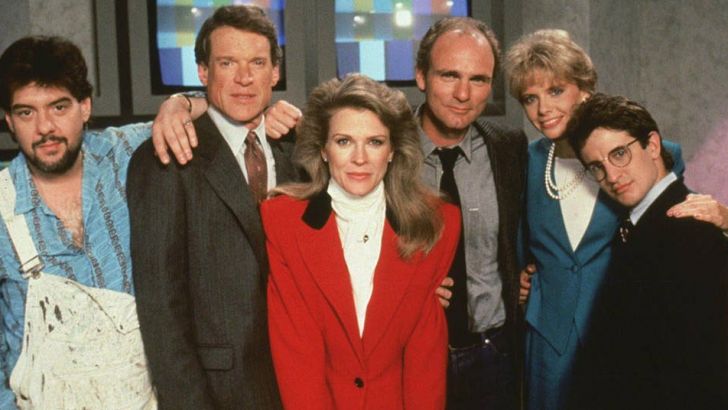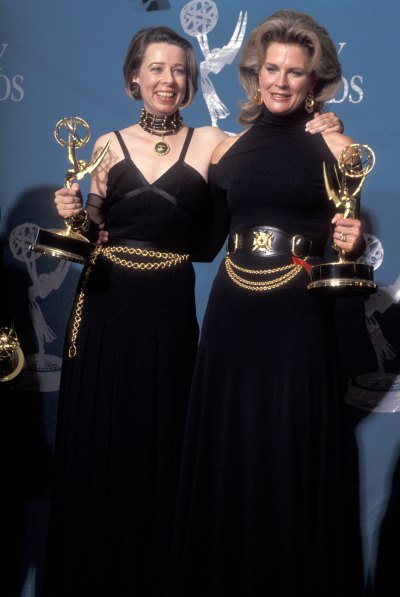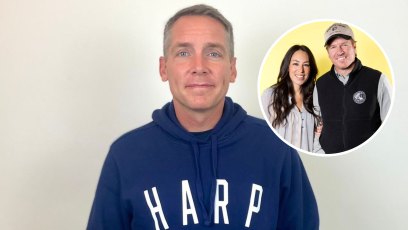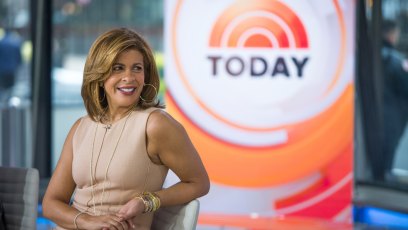
Warner Bros
‘Murphy Brown’ Then And Now — Plus Why We Need The Reboot More Than Ever
It’s difficult to look back at 1988 and not recognize how important it was in terms of television sitcom history, as writers had begun tackling issues that previously had not been as fully explored before. Roseanne put its focus on a blue collar family struggling to survive economically; The Wonder Years offered up a look back at the 1960s — and everything that decade represented — that was humorous yet so realistic that virtually anyone growing up at that time could fully identify with it; and Murphy Brown took on politics, the media, and the idea of an older woman in the workplace. Significantly, two of the three shows have been revived, with Murphy about to hit the air.
In terms of the latter, Candice Bergen plays the title character, a recovering alcoholic who returns to the fictional TV newsmagazine FYI following a stint in rehab. Notes Wikipedia, “Over 40 and single, she is sharp-tongued and hard as nails. In her profession, she is considered one of the boys, having shattered many glass ceilings encountered during her career. Dominating the FYI news magazine, she is portrayed as one of America’s hardest-hitting (though not the warmest or more sympathetic) media personalities.” The new version, of course, is set in our world of 24-hour cable, social media, “fake news,” and a vastly different political climate. Notes CBS, “Amid a divided nation, chaotic national discourse, and rampant attacks on the press, Murphy decides to return to the airwaves and recruits her FYI team: lifestyle reporter Corky Sherwood (Faith Ford), investigative journalist Frank Fontana (Joe Regalbuto), and her former wunderkind news producer, Miles Silverberg (Grant Shaud).”

They’re joined by social media director Pat Patel (Nik Dodani), who is tasked with bringing Murphy and the rest into the 21st Century; Murphy’s milennial son, Avery (Jake McDorman), who shares his mother’s combative spirit and quick wit and is also a journalist; and, at Phil’s Bar — their usual Washington, DC hangout — Phyllis (Tyne Daly), who has taken over from her late brother. Says the network, “Murphy is determined to draw the line between good television and honest reporting, proving that the world needs Murphy Brown now more than ever.”
“We kind of toyed with the idea, almost jokingly, of bringing the show back in 2012 when Sarah Palin was running for vice president, and we thought we only had six episodes,” explains series creator Diane English, who is guiding the new version as well, “but it wasn’t a serious consideration at all. And then we had an election and Peter Roth from Warner Bros came to us and said, ‘Would you consider bringing the show back?’ Candice and I were kind of reluctant, because we felt we had done it. But as the months ticked by, it started to feel like we maybe had a real reason to come back, though it was kind of a daunting experience to go back and revisit this.”

The approach, she explains, hasn’t changed. “Our show always lived in the real world and was based in Washington DC, and we’ve always been a political show with something to say,” she offers, “but I’m really focusing the show through the prism of the press. The First Amendment and the free press is under attack like I’ve never seen it before; like I don’t think anybody’s ever seen before. The press is not the enemy of the people, and these guys, our characters, are the press. So we deal with that a lot.
“I’d also like to add, as far as what’s different,” Diane continues, “when we left these characters in 1998, there was no Internet. There was no social media. Cable news was just getting started. So to take these characters and put them in the world of 24-hour cable news, which is what their new show is, it was very rich for us. Very, very rich. I also have to say, I think we were approached not only because of the political atmosphere, but certainly the success of Will & Grace was encouraging. They came back and almost didn’t skip a beat and were very embraced. It’s always a worry that you are going to go back and ruin your legacy.”
Murphy Brown, In the Beginning
In many ways, the character of Murphy Brown was inspired by Diane’s own experiences. “There was a point in my life,” she tells the Television Academy Foundation, “where I thought I wanted to be a journalist; I thought I wanted to be Barbara Walters or I wanted to write for The New York Times. All of it just sort of blended together in my head, so I wrote a half hour comedy about a strong woman who happened to be an on-camera journalist, a broadcast journalist, with flaws, who was just turning 40 as I was. I didn’t see that on television. You know, you were either a mom or the grandma, but you weren’t a powerful career woman on television. Mary Tyler Moore was it. I mean, that was over and out, so Murphy was the next step in the evolution, I think, for females on TV.”

Getting there, however, wasn’t easy. Having a 40-year-old star was actually a problem, and one that she feels continues to exist. What’s ironic, though, is that the thing that had interested CBS in buying the idea in the first place was also the thing that ultimately scared them.
Notes Diane, “It was about a woman who was a recovering alcoholic who was very famous, and who was just coming back to work after the stint in rehab. All these things sounded like they had a really good story to them, but when it came time to actually doing it, the fear factor kicked in. You’d start to hear things like, ‘Does she have to be 40? What if she were 30? Does she have to be coming back from rehab? Could it be that she was just stressed out and maybe she was coming back from a spa?’ They were trying to remove all of the things that made her unique. They started to take the sandpaper to it and wanted to smooth away.”

Somehow, though, she managed to maintain her vision for the show, and dove into it fully. “I started this project wanting to make that character as real as possible and as believable as possible,” she says. “We did a lot of research. We went to CBS and spent time with Dan Rather, and he let us folow him around. We interviewed all the people that worked for him, we talked to Diane Sawyer and we just did a lot of deep background. Linda Ellerbee was enormously helpful, the people on 60 Minutes were enormously helpful. My idea was to blur that line as much as possible between news and entertainment, fiction and nonfiction. And I think people really bought into it. I mean, I’d heard some scary thing that people were actually getting their news from watching Murphy Brown on Mondays. We would produce shows three weeks out from our broadcast time, which we did on purpose, because we were trying to be timely. Of course, anything can happen in a three-week period, but a lot more can happen in a six-week period.
The Dan Quayle Controversy
The blurring of reality and fiction was never more apparent than when, in the 1991-92 season, Murphy became pregnant and, after giving birth as a single mother, became a talking point during the 1992 presidential election. Then vice president Dan Quayle spoke at the Commonwealth Club in San Francisco, during which he actually criticized Murphy Brown as someone “mocking the importantance of fathers by bearing a child alone.” A massive public discussion on this followed (part of which included many wondering if Quayle was actualy aware that his target of derision was actually a fictional character), addressed in the show’s 1992 season premiere where footage of Quayle was integrated, making it seem as though he were attacking Murphy. And the character ultimately had her moment to respond. A true blurring of the real and reel worlds.

“We were so mortified that Dan Quayle was a heartbeat away for the presidencey, that we just felt it was our job to do a Dan Quayle joke every week,” Diane reveals. “So every week we did one, and then, after a while, it was beocming too easy, because he would say and do things that we could not make up. So eventually we phased that out, but apparently it left quite an impression on him. He never forgot.
“But when the baby was born,” she elaborates, “Dan Quayle made that famous speech. He was really right on track, but then he made the mistake of blaming the fall of Western civilization on this fictional character. He hadn’t seen the episode, so he was assuming that it was all very frivolous and we were just sort of making light of single motherhood. Well, that ignited a whole firestorm. It was astounding. I mean, we were on the front page of The New York Times, and it was just very overwhelming.”

As to the decision to give Murphy a baby in the first place, she says, “It was a really big decision. Our show was kind of founded on the idea that we were writing a show about a very strong, successful single woman. We had legions of single women watching us. We were at the end of our third season and we were looking for a way to make the show fresh. Candice and I have talked about it from time to time, but ultimately it came down to a decision about what is the biggest challenge we can give this character that we’ve created and come to know? What other challenges can we give her that she hasn’t already embraced and tackled? And for a character who has made no room in her life for a pet, for a man, for best friends other than her job, we thought, ‘Okay, a child would be the biggest challenge.’ We knew it could open up huge possibilities for us in terms of comedy without turning the show into one about a mom.”
Rebirth and Legacies
The original Murphy Brown came to an end in 1998, with the character not only having given birth, but battling breast cancer as well, while simultaneously continuing its commentary on the world around it. That will also be important in the new version.
“We have an incredibly smart team of writers,” Diane points out. “Five or six of them are writers from the original, and we always had this uncanny ability to look ahead at what might happen and then put it into an episode. So it always seemed like we had a crystal ball, and the same thing is happening again. Our second episode is right on the money in terms of what’s in the headlines right now. We actually stopped developing stories when we got to episode nine — we have a total of 13 — because we don’t want to get too far ahead. Like with the old show, we air three weeks from the time we shoot, and we are shooting digitally, which means we have the ability to go and pop in something extremely topical; a comment or a joke. By the time we get to our last episode, our turnaround time is six days, so we are going to really take advantage of that.”

And for those wondering, there will indeed be an episode that addresses #MeToo. “I can’t spoil it,” she says, “but I can tell you that in the writers room we have a great collection of people. They are younger, they are older, they are male, they are female, they are gay, they are straight. In developing this episode, we came at it from so many different angles, beause it is such a complicated issue. And I don’t think there’s a woman out there who hasn’t had some experience with misogyny or misconduct. It’s a powerful movement, and we wanted to do it justice. The episode title is #MurphyToo.”
Given the history of Murphy Brown, on more than one occasion Diane has been asked about the show’s legacy. “I’m not good at stating legacies,” she admits, “but I think what it did in its time is that it was the gold standard for writing comedy on TV. We wrote with a different voice, we wrote with a different style. We weren’t afraid of the real moments. We didn’t back off of them with jokes. We assumed that the audience was smart, and we embraced the fact that she was a 40-year-old woman who was sexy and smart and strong. And after the show was successful, it paved the way for a lot of what was to come.”
Murphy Brown premieres on CBS Sept. 27.








































